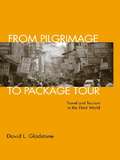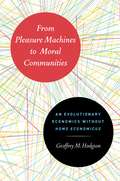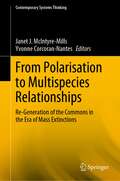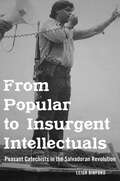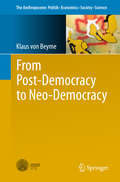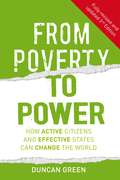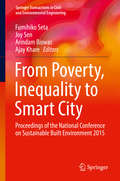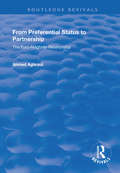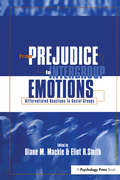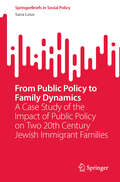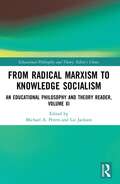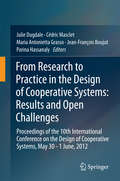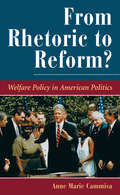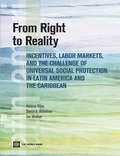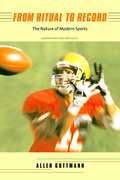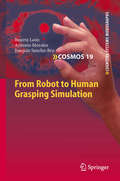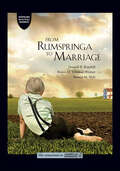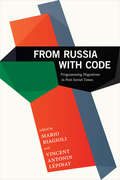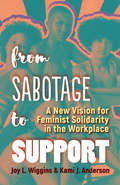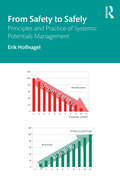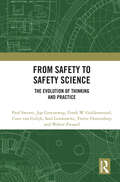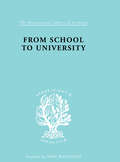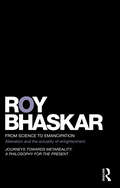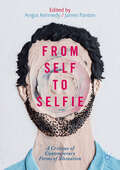- Table View
- List View
From Pilgrimage to Package Tour: Travel and Tourism in the Third World
by David L. GladstoneWhen people in First World countries think of tourists in the vast expanses of the Third World today, they typically think of pampered westerners, filling up the luxury hotels and imposing their Orientalist gazes on the teeming masses. As David Gladstone shows us in this fascinating and provocative book, such preconceptions are wrong. Coupling incisive and colorful ethnographic accounts of tourism in India and Mexico with sharp analysis, Gladstone demonstrates the amazing complexity of this industry, which now comprises close to ten percent of the world economy. As he also shows, the vast majority of tourists in the Third World are indigenous people with few resources-often making pilgrimages to religious shrines.From Pilgrimage to Package Tour is a fresh and entirely original account that stands tourism studies on its head and proves that this industry is far more complicated than it initially appears.
From Pleasure Machines to Moral Communities: An Evolutionary Economics without Homo economicus
by Geoffrey M. HodgsonAre humans at their core seekers of their own pleasure or cooperative members of society? Paradoxically, they are both. Pleasure-seeking can take place only within the context of what works within a defined community, and central to any community are the evolved codes and principles guiding appropriate behavior, or morality. The complex interaction of morality and self-interest is at the heart of Geoffrey M. Hodgson's approach to evolutionary economics, which is designed to bring about a better understanding of human behavior. In From Pleasure Machines to Moral Communities, Hodgson casts a critical eye on neoclassical individualism, its foundations and flaws, and turns to recent insights from research on the evolutionary bases of human behavior. He focuses his attention on the evolution of morality, its meaning, why it came about, and how it influences human attitudes and behavior. This more nuanced understanding sets the stage for a fascinating investigation of its implications on a range of pressing issues drawn from diverse environments, including the business world and crucial policy realms like health care and ecology. This book provides a valuable complement to Hodgson's earlier work with Thorbjorn Knudsen on evolutionary economics in Darwin's Conjecture, extending the evolutionary outlook to include moral and policy-related issues.
From Polarisation to Multispecies Relationships: Re-Generation of the Commons in the Era of Mass Extinctions (Contemporary Systems Thinking)
by Yvonne Corcoran-Nantes Janet J. McIntyre-MillsThis book explores the concept of multi-species relationships and suggests critical systemic pathways to protect shared habitats. This book discusses how the eradication of species as a result of rapid urbanisation places humanity at risk. This book demonstrates how narrow anthropocentrism has focused on the rights of human beings at the expense of other species and the environment. This book explores a priori norms and a posteriori measures and indicators to include and protect multiple species. This book aims to strengthen institutional capacity and powers to address and extend the UN 2030 Sustainable Development Agenda by drawing on local wisdom but also the need to implement laws to prevent ecocide. This book highlights that our fragile interdependence requires a recognition of our hybridity and interconnectedness within the web of life and suggests ways to reframe policy within and beyond the nation state to support living systems of which we are a strand.
From Popular to Insurgent Intellectuals: Peasant Catechists in the Salvadoran Revolution
by Leigh BinfordFrom Popular to Insurgent Intellectuals explains how a group of Catholic lay catechists educated in liberation theology came to take up arms and participate on the side of the rebel FMLN during El Salvador’s revolutionary war (1980-92). In the process they became transformed from popular intellectuals to insurgent intellectuals who put their organizational and cognitive skills at the service of a collective effort to create a more egalitarian and democratic society. The book highlights the key roles that peasant catechists in northern Morazán played in disseminating liberation theology before the war and supporting the FMLN during it—as quartermasters, political activists, and musicians, among other roles. Throughout, From Popular to Insurgent Intellectuals highlights the dialectical nature of relations between Catholic priests and urban revolutionaries, among others, in which the latter learned from the former and vice-versa. Peasant catechists proved capable at making independent decisions based on assessment of their needs and did not simply follow the dictates of those with superior authority, and played an important role for the duration of the twelve-year military conflict.
From Post-democracy to Neo-Democracy (The Anthropocene: Politik—Economics—Society—Science #20)
by Klaus Von BeymeThis book of a renowned political scientist and specialist in political theory fundamentally challenges the new fashion of post-democracy by offering an outlook on ‘neo-democracy’. The political periods are similar to epochs in modern art, where ‘neo’ succeeded Post-impressionism and Post-expressionism. This book reviews the topical debate on postdemocracy and scenarios of decline in democratic theory without the alternative of dictatorship. It discusses criticism of politics in the old and new media and a new culture of protest. It addresses new forms of participation and the dangers of populism and right-wing extremism. It proposes institutional reforms of democracy, of the parliamentary system and the party state, in negotiations of coalition-building, in governmental declarations and for the policy output. The book concludes with a debate of normative models of democracy from ‘Post-democracy’ to ‘Neo-democracy’, models of justice and theories of democratic reform.
From Poverty to Power: How Active Citizens and Effective States Can Change the World (Second Edition)
by Duncan GreenThe book discusses different types of initiatives across the world that have enhanced and expanded the powers of the powerless and emphasizes how 'active citizenship' can be a very effective way of seeking solutions.
From Poverty, Inequality to Smart City
by Fumihiko Seta Arindam Biswas Ajay Khare Joy SenThis book is a comprehensive document visualizing the future of built environment from a multidisciplinary dimension, with special emphasis on the Indian scenario. The multidisciplinary focus would be helpful for the readers to cross-refer and understand others' perspectives. The text also includes case studies substantiating theoretical research. This method of composition helps the book to maintain rational balance among theory, research and its contextual application. The book comprises selected papers from the National Conference on Sustainable Built Environment. The chapters provide varied viewpoints on the core issues of urbanization and planning, especially in the economically diverse Indian market. This compilation would be of interest to students, researchers, professionals and policy makers.
From Preferential Status to Partnership: The Euro-Maghreb Relationship
by Ahmed AghroutThis title was first published in 2000. Moving from general principles and determinants to the growing co-operation between the European Community and Maghreb states, and then onto the EU's responses to recent problems in Maghreb countries, this study concludes that a more assertive EU presence is needed, otherwise there will be damaging costs for the already fragile regional stability. The text mixes historical, political and economic analysis.
From Prejudice to Intergroup Emotions: Differentiated Reactions to Social Groups
by Diane M. Mackie Eliot R. SmithThe theories or programs of research described in the chapters of this book move beyond the traditional evaluation model of prejudice, drawing on a broad range of theoretical ancestry to develop models of why, when, and how differentiated reactions to groups arise, and what their consequences might be. The chapters have in common a re-focusing of interest on emotion as a theoretical base for understanding differentiated reactions to, and differentiated behaviors toward, social groups. The contributions also share a focus on specific interactional and structural relations among groups as a source of these differentiated emotional reactions. The chapters in the volume thus reflect a theoretical shift from an earlier emphasis on knowledge about ingroups and outgroups to a new perspective on prejudice in which socially-grounded emotional differentiation becomes a basis for social regulation.
From Public Policy to Family Dynamics: A Case Study of the Impact of Public Policy on Two 20th Century Jewish Immigrant Families (SpringerBriefs in Social Policy)
by Sana LoueThis compact book relies on the story of two intertwined Jewish immigrant families to tell a multigenerational Jewish story about the interplay between public/social policy, cultural categories, and the lived experience of working class immigrant Jews from Eastern Europe, including trans-/intergenerational trauma. Importantly, it focuses on the impacts of pre-Holocaust public policy, a significant departure from the Holocaust and post-Holocaust focus of much of the published literature relating to Jewish intergenerational trauma. As such, it offers the possibility of better understanding the far-reaching and perhaps unforeseen impacts of public policy. This book addresses events on both the micro and macro levels and is biographical, autobiographical, and historical in its scope. Sources for this work include archival materials, census records, maps, military records, birth and death certificates, congressional materials, newspaper articles, films, images, interviews with living family members, and secondary sources. Among the topics covered are: Russian, Soviet, and U.S. Eugenics: Family Internalization of Policy and Rhetoric The Intertwined Impact of Economics, Eugenic Policy, and Immigration Restrictions The Present Past: Policy, Identity, and Progeny From Public Policy to Family Dynamics: A Case Study of the Impact of Public Policy on Two 20th Century Jewish Immigrant Families adds a human face to writings related to public/social policy. As the book integrates understandings from diverse fields of study, students of public policy, social work, psychology, history, Jewish studies, immigration studies, bioethics, and public health, as well as social workers, bioethicists, and historians, would be most interested in reading this unique work.
From Radical Marxism to Knowledge Socialism: An Educational Philosophy and Theory Reader, Volume XI (Educational Philosophy and Theory: Editor’s Choice)
by Michael A. PetersThis volume examines the place of Marxist theory in the history of the journal Educational Philosophy and Theory, primarily through the selection and exploration of typical and significant articles exploring Marxist-related themes in the journal over time. The title, From Radical Marxism to Knowledge Socialism, reflects this historical approach. In the 1960s and 1970s, Marxism was considered to be a radical, extreme ‘political’ theory, while western liberalism and a free-market economy were largely taken for granted as natural phenomena, in western philosophy of education and in the journal. More recently, educational theorists have begun to explore trends related to the neoliberal age. Paradoxically, such trends include the move toward knowledge socialism, which decenters the normative presuppositions of knowledge capitalism as the latest iteration of western liberalism. The volume begins with an introductory chapter that examines the history of Marxism in western philosophy and philosophy of education. The rest of the book features works selected from the journal that further illustrate the evolution of Marxist theoretical perspectives in the field over time. This collection thus gives a sense of the range and extent of Marxist-inspired thinking in educational philosophy and theory. This book will be of interest to students and scholars of educational philosophy and theory and others who are interested in exploring in depth the evolution of key themes in this field over time, including liberalism, ideology, Marxism, neoliberalism, knowledge construction, capitalist and socialist schooling, and other aspects of economic analysis in education.
From Research to Practice in the Design of Cooperative Systems: Results and Open Challenges
by Parina Hassanaly Maria Antonietta Grasso Jean-François Boujut Cédric Masclet Julie DugdaleCOOP 2012 is the tenth COOP conference, marking twenty years from the first conference in 1992. In this special anniversary edition we asked researchers and practitioners to reflect on what have been the successes and the failures in designing cooperative systems, and what challenges still need to be addressed. We have come a long way in understanding the intricacies of cooperation and in designing systems that support work practices and collective activities. These advances would not have been possible without the concerted effort of contributions from a plethora of domains including CSCW, HCI, Information Systems, Knowledge Engineering, Multi-agent systems, organizational and management sciences, sociology, psychology, anthropology, ergonomics, linguistics, etc. The COOP community is going from strength to strength in developing new technologies, advancing and proposing new methodological approaches, and forging theories.
From Rhetoric to Reform?: Welfare Policy In American Politics (Dilemmas in American Politics)
by Anne Marie CammisaWelfare policy illustrates both the strengths and weaknesses of the American political process. The central political dilemma is how welfare policy can assist the poor without creating dependency. Although policy solutions tend to focus on the short term, they are often responsive to public input. This book explores why the debate on welfare policy has shifted to the conservative's vantage point. In discussing how political rhetoric shapes the welfare debate, Anne Marie Cammisa considers questions such as: What happened to welfare? How did it become a program fraught with problems and abuses? Why and when was welfare the answer to a problem—and when did it become the problem? She reviews our response to caring for the less fortunate and examines welfare policy from the federal to the state level. A chapter is devoted to the 1996 welfare reform bill and its impact on the states in 1997.
From Right to Reality
by Helena Ribe Ian Walker David RobalinoThis study highlights the interaction between social protection (SP) programs and labor markets in the Latin America region. It presents new evidence on the limited coverage of existing programs and emphasizes the challenges caused by high informality for achieving universal social protection for old age income, health, unemployment risks and anti-poverty safety nets. It identifies interaction effects between SP programs and the behavioral responses of workers, firms and social protection providers, which can further undermine efforts to expand coverage, summarizing evidence from recent work across the region. The book argues for a re-design of financing to eliminate cross subsidies between members of contributory programs and subsidies that effectively tax income from formal employment. It advocates well-targeted, tax-funded, tapered subsidies to provide incentives to the savings efforts of low-income workers, coupled with an effective safety net for the extreme poor who have no capacity to contribute to financing their own social protection arrangements. It also argues for the consolidation of programs and harmonization of benefits packages across different insurers. The book develops an overall conceptual framework and presents in-depth analysis of the main SP sectors of pensions, health, unemployment insurance and labor market programs, and safety net transfers.
From Ritual to Record: The Nature of Modern Sports
by Allen GuttmannOriginally published in 1978, From Ritual to Record was one of the first books to recognize the importance of sports as a lens on the fundamental structure of societies. In this reissue, Guttmann emphasizes the many ways that modern sports, dramatically different from the sports of previous eras, have profoundly shaped contemporary life.
From Robot to Human Grasping Simulation
by Beatriz León Antonio Morales Joaquín Sancho-BruThe human hand and its dexterity in grasping and manipulating objects are some of the hallmarks of the human species. For years, anatomic and biomechanical studies have deepened the understanding of the human hand's functioning and, in parallel, the robotics community has been working on the design of robotic hands capable of manipulating objects with a performance similar to that of the human hand. However, although many researchers have partially studied various aspects, to date there has been no comprehensive characterization of the human hand's function for grasping and manipulation of everyday life objects. This monograph explores the hypothesis that the confluence of both scientific fields, the biomechanical study of the human hand and the analysis of robotic manipulation of objects, would greatly benefit and advance both disciplines through simulation. Therefore, in this book, the current knowledge of robotics and biomechanics guides the design and implementation of a simulation framework focused on manipulation interactions that allows the study of the grasp through simulation. As a result, a valuable framework for the study of the grasp, with relevant applications in several fields such as robotics, biomechanics, ergonomics, rehabilitation and medicine, has been made available to these communities.
From Rumspringa to Marriage: An Excerpt from The Amish
by Steven M. Nolt Donald B. Kraybill Karen M. Johnson-WeinerHopkins Digital Shorts deliver high-quality scholarship and compelling narratives in an abbreviated, electronic format. Whether excerpted from forthcoming or classic backlist titles or developed with newly commissioned content, Hopkins Digital Shorts provide concise introductions to fundamental concepts, defining moments, and influential texts.Rumspringa, literally translated as "running around," is a time when Amish youth socialize with their peers and are allowed some autonomy before officially joining the church as young adults. It has become one of the most recognized aspects of Amish life, both real and mythologized. During this time they face the two most crucial decisions of their lives: whether to join the church, and if and whom to marry. Rumspringa, an exciting adventure and at times a period of inner turmoil, commences at age sixteen—or seventeen in more traditional groups—and continues until marriage. With few exceptions, adolescents eagerly count the days until they are old enough to join the young folks. In this digital short, Kraybill considers the nuances of this important rite of passage into Amish adulthood.
From Russia with Code: Programming Migrations in Post-Soviet Times
by Mario Biagioli Vincent Antonin LépinayWhile Russian computer scientists are notorious for their interference in the 2016 US presidential election, they are ubiquitous on Wall Street and coveted by international IT firms and often perceive themselves as the present manifestation of the past glory of Soviet scientific prowess. Drawing on over three hundred in-depth interviews, the contributors to From Russia with Code trace the practices, education, careers, networks, migrations, and lives of Russian IT professionals at home and abroad, showing how they function as key figures in the tense political and ideological environment of technological innovation in post-Soviet Russia. Among other topics, they analyze coders' creation of both transnational communities and local networks of political activists; Moscow's use of IT funding to control peripheral regions; brain drain and the experiences of coders living abroad in the United Kingdom, United States, Israel, and Finland; and the possible meanings of Russian computing systems in a heterogeneous nation and industry. Highlighting the centrality of computer scientists to post-Soviet economic mobilization in Russia, the contributors offer new insights into the difficulties through which a new entrepreneurial culture emerges in a rapidly changing world. Contributors. Irina Antoschyuk, Mario Biagioli, Ksenia Ermoshina, Marina Fedorova, Andrey Indukaev, Alina Kontareva, Diana Kurkovsky, Vincent Lépinay, Alexandra Masalskaya, Daria Savchenko, Liubava Shatokhina, Alexandra Simonova, Ksenia Tatarchenko, Zinaida Vasilyeva, Dimitrii Zhikharevich
From Sabotage to Support: A New Vision for Feminist Solidarity in the Workplace
by Joy L. Wiggins Kami J. AndersonWomen are acculturated within systems that encourage them to sabotage one another; this book shows how they can break free of this cultural programming and use whatever privilege and power they have to raise each other up.Joy Wiggins and Kami Anderson advocate that the only way women can successfully support each other is by addressing the varying intersections of our individual power and privileges, particularly focusing on how some privileges are inherited along lines of race, class, sexuality, and geography. When we fully examine how we have power in certain situations and not in others, we start to see where we can lend privilege to create truly inclusive spaces for the historically underrepresented and marginalized. Wiggins and Anderson look at how the dynamics of privilege and power have played out in the history of the feminist movement and identify and break down socialized behaviors and ideologies that trigger implicit bias and microaggressions. And they provide tools to interrupt negative thoughts and actions so women can nurture mutual support and show up as their authentic selves. Each chapter features a dialogue between them reflecting on how issues of race, privilege, and power have played out in their lives and their friendship.The system of patriarchy has created an environment for women to knowingly and unknowingly sabotage each other—it is not inherent in women themselves. This book teaches us how to take an active approach to becoming better allies for each other and by so doing improve our world and end the cycle of injustice.
From Safety to Safely: Principles and Practice of Systemic Potentials Management
by Erik HollnagelThe conventional interpretation of safety, known as Safety-I, denotes a condition where as little as possible goes wrong, and the focus of practical efforts in management or analysis is on the occurrence of unacceptable outcomes and on how to reduce their number to an acceptable level, ideally zero. The emphasis is therefore on how to manage safety as such, as seen in the ubiquitous safety management systems (SMS). As Professor James Reason astutely points out, this raises the interesting question of how it is possible to learn about something, let alone manage it, if it is studied only in situations in which it is absent. The solution proposed by and described in this book is to stop using safety as a noun and instead use it as an adverb: safely.Now often referred to as Safety-II, this solution is the logical consequence of resilience engineering and will require new methods, several of which already exist and have proved their worth in practice for years. The question ceases being what to manage and becomes how to manage. Managing safety is protective, hence a non-productive cost, which at best avoids a loss. Conversely, managing safely is productive and can generate revenue in addition to preventing or avoiding losses; aviation and mining are prime examples.From Safety to Safely provides a practical perspective on managing safely, illustrating a practical form of synesis. It offers a new understanding of safety, combining concerns for productivity and safety rather than juxtaposing them, and it shows how to manage complex industrial and social systems in the spirit of resilience engineering and synesis. It is the first book to completely dispense with the loaded term "safety" while offering a practical and viable alternative. Spoiler alert: this book does not mention or analyse any celebrated accidents.This book is for all middle and senior managers, board members, and independent consultants seeking to ensure safe, revenue-generating operations.
From Safety to Safety Science: The Evolution of Thinking and Practice
by Frank W. Guldenmund Coen van Gulijk Paul Swuste Jop Groeneweg Saul Lemkowitz Yvette Oostendorp Walter ZwaardHow do accidents and disasters occur? How has knowledge of accident processes evolved? A significant improvement in safety has occurred during the past century, with the number of accidents falling spectacularly within industry, aviation and road traffic. This progress has been gradual in the context of a changing society. The improvements are partly due to a better understanding of the accident processes that ultimately lead to damage. This book shows how contemporary crises instigated the development of safety knowledge and how the safety sciences pieced their theories together by research, by experience and by taking ideas from other domains. From Safety to Safety Science details 150 years of knowledge development in the safety sciences. The authors have rigorously extracted the essence of safety knowledge development from more than 2,500 articles to provide a unique overview and insight into the background and usability of safety theories, as well as modelling how they developed and how they are used today. Extensive appendices and references provide an additional dimension to support further scholarly work in this field. The book is divided into clear time periods to make it an accessible piece of science history that will be invaluable to both new and experienced safety researchers, to safety courses and education, and to learned practitioners.
From School to University: A Study with Special Reference to University Entrance (International Library of Sociology #Vol. 228)
by R.R. DaleFirst published in 1998. Routledge is an imprint of Taylor & Francis, an informa company.
From Science to Emancipation: Alienation and the Actuality of Enlightenment (Classical Texts in Critical Realism (Routledge Critical Realism))
by Roy BhaskarFrom Science to Emancipation: Alienation and the Actuality of Enlightenment is the second of three books elaborating Roy Bhaskar’s new philosophy of metaReality, which appeared in rapid succession in 2002. With a new introduction from Mervyn Hartwig, this book contains some of the original transcripts and the questions and answers they provoked, from a variety of lecture and workshop tours Roy Bhaskar presented for Indian audiences before this book was first published. Because of the spontaneous and informal nature of these talks and discussions, this book continues to provide the most immediate and accessible introduction to Roy Bhaskar's philosophy as it charts his intellectual journey. The talks recorded here have retained an immediate local but also deeply universal interest. From Science to Emancipation provides an indispensible resource for all students of philosophy and the human sciences.
From Self to Selfie: A Critique of Contemporary Forms of Alienation
by Angus Kennedy James PantonThis edited collection charts the rise and the fall of the self, from its emergence as an autonomous agent during the Enlightenment, to the modern-day selfie self, whose existence is realised only through continuous external validation. Tracing the trajectory of selfhood in its historical development - from the Reformation onwards - the authors introduce the classic liberal account of the self, based on ideas of freedom and autonomy, that dominated Enlightenment discourse. Subsequent chapters explore whether this traditional notion has been eclipsed by new, more rigid, categories of identity, that alienate the self from itself and its possibilities: what I am, it seems, has become more important than what I might make of myself. These changing dynamics of selfhood – the transition From Self to Selfie - reveal not only the peculiar ways in which selfhood is problematized in contemporary society, but equally the tragic fragility of the selfie, in the absence of any social authority that could give it some security.
From Sexless Marriage to Sex Goddess: A Memoir
by Alisa KriegelFor fans of Eat Pray Love and Maybe You Should Talk to Someone, a therapist&’s tale of mid-life sexual awakening as she bravely explores relationships, sex, and pleasure—and learns that it&’s never too late to desire and be desired.Is it ever too late to connect to the sexual part of yourself? At forty-eight years old, after her husband announced he had fallen in love with a man, Alisa Kriegel was determined to finally figure out this essential part of herself. As a psychologist, she had the tools to help others; now, it was time to help herself. Alisa&’s bold and vulnerable story told with honesty and humor, shows us that it&’s possible to have a sexual awakening—and to experience the thrill of feeling desired—at any age. Letting go of decades of shame and giving herself permission for pleasure was just the beginning of jumping into a series of adventures in online dating, sex, and romance. From sex clubs in New York City to a canoe trip in the Canadian wilderness, this memoir offers readers an insight-filled journey into one woman&’s mid-life discoveries about sex, love, and relationships—and a behind-the-scenes, in-depth analysis of women&’s sexuality.
